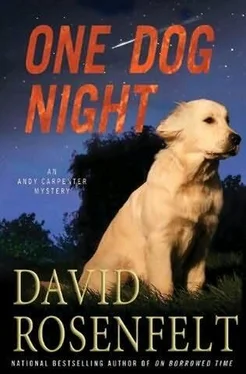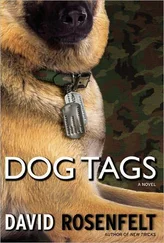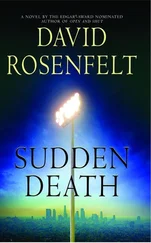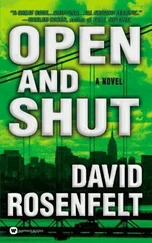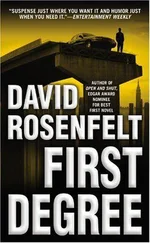“Interesting historical reference,” I say.
“Andy, Hike thinks of the Great Depression as the good old days. He says we’re heading for much worse, that the way things are going, the United States is soon going to consist of two things, Wall Street and dust.”
I try to stifle a laugh, but can’t quite do so.
“Andy…”
“I’m sorry. Where is he now?”
“In a diner, possibly using the bathroom.”
“Why possibly?”
“It’s our fourth try. The last three weren’t sanitary enough. He said something about dysentery, and lizards, or something. I’m losing track.”
“What are you and Hike doing tomorrow?” I ask.
“We’re going to drive around for a while, and then I’m going to strangle him and bury his body.”
I’ve got nothing to do and nowhere to go.
I’d like to be in Texas with Laurie and the team, but I need to be here in case the jury has a question or, God forbid, a verdict. What I really should have done was keep Hike here, and gone down there in his place. I think Laurie would have been in favor of that.
So I’m tied to the phone, hoping Laurie will call with good news, and hoping the court will not call with bad news. Instead nobody calls, with the exception of Willie Miller, asking me if I’d read his book when it’s finished, which is apparently going to be any day.
“You think I need to read it?” he asks.
“No, you already know the ending.”
“Cool.”
I head down to the jail to see Noah and brief him on what’s going on. I’ve been a little lax in doing so, and he wasn’t even aware that the meeting was taking place between the FBI and Judge De Luca.
Before I even relate the story, I tell him that the outcome was not positive. I don’t want him to get his hopes up, even for a few minutes. He’s the one with his freedom on the line, not me, and he needs to know the straight scoop.
“Becky thinks the jury is going to say I’m not guilty,” he says. “At least that’s what she tells me.”
“Needless to say, I hope she’s right.”
“But you don’t think she is.”
I shake my head. “No, I don’t. But I do think it’s a good sign that they haven’t come back yet. Maybe we’ve got some holdouts on our side.”
“Maybe.”
“Noah, if you get convicted, it’s not over. I really mean that; we’ve got a lot going for us. This thing hasn’t played out yet.”
I don’t think he believes me, and I can’t say I blame him. I tell him that I’ll let him know if anything happens, and I leave to go home.
I’ll take Tara and Bailey for a walk, and then I’ll look through the case files again, just in case I’ve missed something the other four hundred times I’ve read them.
But basically I’ll do nothing.
Deep under the ground, the eight men were finished with their work.
The canisters had been taken up the elaborate system of pulleys, and loaded onto a waiting truck. It was the culmination of years of work, done in secret.
The men had been chosen well. They were extraordinary workers, loners without family or close friends. They could be trusted to keep the confidentiality of the mission, and would basically do anything for money. Investigators had been tracking them, without their knowledge, and all were judged to have kept silent.
They were, of course, very well paid, but what really motivated them was the promise of a huge bonus when the work was completed.
They had just gotten an apparently sincere thank-you speech from a man they had never met before, but who seemed as if he was in charge of the entire operation. More importantly, they had just received their bonus checks, and were delighted to see that each was twenty-five percent higher than promised.
The man also thanked them for their having kept the secret for so long, and impressed upon them the importance of continuing to do so. He also made a surprise promise that if, in five years, the operation was still a secret, each man in the group would receive another check.
Were any of them to move, the man gave them a number to contact, to inform him of their new address and contact information. That was to enable him to forward that supplementary bonus, but also to make it possible for them to be reached should another job like this one come up.
And with the kind of money that they’d earned, another job like this one would be very welcome.
The man went around and shook each of their hands, offering personal thanks. He then went up the pulley to the truck, asking them to wait at least a half hour to leave, and then to leave one at a time, so as not to call attention to themselves, should anyone be around.
Then the man went up to the truck, where the driver was waiting for him. He signaled for the driver to come down out of the truck and help him load something, and when the driver did as instructed, the man shot him through the head.
The man dragged the driver’s body a few feet to the open mine, and pushed it over the edge. He listened, until he could hear the body strike bottom, though the drop was so long that the sound was barely audible.
The man then climbed into the truck, drove half a mile, and then took out his cell phone, and dialed a number. It was a number that was prearranged six months ago, and it set off the explosives that had been planted at the same time.
The explosion was enormous, and the man could see and hear it from his distant vantage point. He knew that it had forced the mine to cave in on itself. Of the nine dead bodies that were in there, the driver was the only one not to have been buried alive.
And then the man drove away.
There is one report in the file that I haven’t read multiple times.
It’s not even a report, but rather the travel documents and records that Gail Lockman had provided to us. I had read it, and noted that it confirmed Laurie’s report of where Gail’s husband Steven had traveled in the period before the fire, just before he went missing.
I will never understand how people, me in particular, can see something one time and not another, when looking at the same thing each time. But it happens to me all the time, and I assume I’m not the only one.
Laurie and I had asked for the information for the purpose of learning where Steven Lockman had gone on his business trips before the fire. That made sense, and it led us to believe that Texas was the place to focus on. That may or may not prove to be a good decision.
But what we didn’t notice were Steven Lockman’s return flights. On the two non-Texas trips he flew back to Newark Airport, which was logical, since he lived not far from there. On the two Texas trips, however, he didn’t fly to Newark.
He flew to Philadelphia.
I call Gail Lockman, and catch a break when she is there and answers the phone. I tell her I have just one more question about Steven, and I can hear the apprehension in her voice. It’s a wound that I keep opening.
“In the weeks before Steven’s death, he flew back to Philadelphia rather than New Jersey. Do you have any idea why?”
“That can’t be right,” she says.
“Why do you say that?”
“Because he would have told me. And we had a thing, call it a superstition, that I always picked him up at the airport. The company would have paid for a cab, but I picked him up every time.”
“And never in Philadelphia?” I ask.
“Never.”
“Did he know anyone there?”
“Not that I know of.”
There seems to be a real possibility that Steven landed in Philadelphia, did whatever business he had there, and then drove to Newark and pretended to his wife that he had flown there. The chance of an affair comes to mind, but it was only twice, and apparently for very short stays.
Читать дальше
